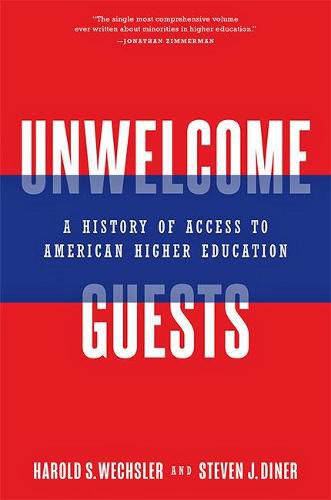Readings Newsletter
Become a Readings Member to make your shopping experience even easier.
Sign in or sign up for free!
You’re not far away from qualifying for FREE standard shipping within Australia
You’ve qualified for FREE standard shipping within Australia
The cart is loading…






A comprehensive history of the barriers faced by students from marginalized racial, ethnic, and religious groups to gain access to predominantly white colleges and universities-and how these students responded to these barriers.
Affirmative action in college admission is one of the most contested initiatives in contemporary federal policy, from its beginnings in the 1960s through the 2014 lawsuit alleging that Harvard discriminates against Asian American applicants. Supporters point out that using race and ethnicity as a criterion for admission helps remediate some of the effects of racist practices on minorities, including restrictions on college admissions. Opponents insist that the practice violates civil rights laws that prohibit racial discrimination and that it reenacts the historic racial bias of colleges.
In Unwelcome Guests, Harold S. Wechsler and Steven J. Diner argue that discrimination in college admissions has a long and troubling history in the United States. Institutions of higher learning have vigorously sought to shape their mission and the experiences of their undergraduate students by paying careful attention to race and religion in admissions decisions. Post-World War I institutions devised exclusionary mechanisms that disadvantaged African Americans and other minority students for much of the century. Wechsler and Diner explore how American colleges and universities sought to restrict enrollment of students they considered undesirable. How, they ask, did these practices change over time? And how did underrepresented students cope with this discrimination-and with the indifference, bare tolerance, or outright hostility of some of their professors and peers?
Tracing the efforts of people from underrepresented racial, ethnic, and religious groups to attend mainstream colleges, Wechsler and Diner also look at how these students fared after graduation, paying particular attention to Black women and men. Unwelcome Guests illuminates a critically important aspect of the history of American colleges and universities but also addresses policy debates about affirmative action and racial/ethnic diversity in colleges today. This profound history of the limits on college access over decades of discrimination will help readers recognize and understand the central role of race in the history of American higher education.
$9.00 standard shipping within Australia
FREE standard shipping within Australia for orders over $100.00
Express & International shipping calculated at checkout
A comprehensive history of the barriers faced by students from marginalized racial, ethnic, and religious groups to gain access to predominantly white colleges and universities-and how these students responded to these barriers.
Affirmative action in college admission is one of the most contested initiatives in contemporary federal policy, from its beginnings in the 1960s through the 2014 lawsuit alleging that Harvard discriminates against Asian American applicants. Supporters point out that using race and ethnicity as a criterion for admission helps remediate some of the effects of racist practices on minorities, including restrictions on college admissions. Opponents insist that the practice violates civil rights laws that prohibit racial discrimination and that it reenacts the historic racial bias of colleges.
In Unwelcome Guests, Harold S. Wechsler and Steven J. Diner argue that discrimination in college admissions has a long and troubling history in the United States. Institutions of higher learning have vigorously sought to shape their mission and the experiences of their undergraduate students by paying careful attention to race and religion in admissions decisions. Post-World War I institutions devised exclusionary mechanisms that disadvantaged African Americans and other minority students for much of the century. Wechsler and Diner explore how American colleges and universities sought to restrict enrollment of students they considered undesirable. How, they ask, did these practices change over time? And how did underrepresented students cope with this discrimination-and with the indifference, bare tolerance, or outright hostility of some of their professors and peers?
Tracing the efforts of people from underrepresented racial, ethnic, and religious groups to attend mainstream colleges, Wechsler and Diner also look at how these students fared after graduation, paying particular attention to Black women and men. Unwelcome Guests illuminates a critically important aspect of the history of American colleges and universities but also addresses policy debates about affirmative action and racial/ethnic diversity in colleges today. This profound history of the limits on college access over decades of discrimination will help readers recognize and understand the central role of race in the history of American higher education.